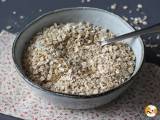What your gut reveals about your health!

Have you ever stopped to think about the importance of your gut? Often overlooked, it plays a fundamental role in our overall health. It is in the gut that most of the digestion and absorption of nutrients from the food we eat takes place. But its functions go far beyond that! The gut is also known as our "second brain", as it is home to billions of bacteria that make up the gut microbiota, and this microbiota directly influences various aspects of our health, from the immune system to mood.
A healthy gut contributes to
- Better digestion: Facilitating the absorption of nutrients and avoiding problems such as bloating and constipation.
- Strengthened immune system: Around 70% of the immune system is located in the gut.
- Lower risk of disease: A healthy gut is associated with a lower risk of chronic diseases such as inflammatory bowel disease, obesity and type 2 diabetes.
- Improved mental health: The intestinal microbiota, the set of bacteria that inhabit the gut, influences the production of neurotransmitters such as serotonin, which regulate mood and sleep.
Foods that nourish your gut:
To cultivate a healthy intestinal flora and strengthen your gut, include fiber in your diet:
- Fiber: Present in fruits, vegetables, whole grains and legumes, fiber feeds the beneficial bacteria in the gut, promoting intestinal regularity and overall health.
- Probiotics: Found in natural yogurts, kefir, sauerkraut and kombucha, probiotics are beneficial bacteria that help rebalance the intestinal flora.
- Prebiotics: Foods rich in fiber, such as garlic, onions, green bananas and asparagus, serve as food for beneficial bacteria, stimulating their growth.
- Fermented foods: Sauerkraut, kimchi, miso and kefir are naturally fermented foods rich in probiotics and enzymes that aid digestion.
- Colorful fruits and vegetables: Rich in antioxidants, vitamins and minerals, these foods help strengthen the immune system and protect intestinal cells.
List of foods that help your intestinal health:
- Fruit: apple, banana, strawberry, blueberry, orange, avocado.
- Vegetables: broccoli, spinach, cabbage, carrots, beet.
- Wholegrain cereals: oats, quinoa, brown rice, wholemeal bread.
- Pulses: beans, lentils, chickpeas, peas.
- Seeds: linseed, chia, sesame.
- Oilseeds: almonds, walnuts, chestnuts.
Tips for even better intestinal health:
- Drink plenty of water: Water helps keep the intestines hydrated and facilitates digestion.
- Maintain a balanced diet: Vary your food to ensure that your body receives all the nutrients it needs.
- Cook at home: Prepare your own meals with fresh ingredients and avoid processed foods.
- Reduce your consumption of sugar and ultra-processed foods: These foods can alter the composition of the intestinal flora and cause inflammation.
- Exercise regularly: Physical activity stimulates intestinal function and improves overall health.
- Manage stress: Stress can negatively affect intestinal health. Practice relaxation techniques such as meditation and yoga.
In other words:
Investing in intestinal health is investing in a healthier and happier life. By including foods rich in fiber, probiotics and prebiotics in your diet, you'll be nourishing your gut and promoting the well-being of your body as a whole. Consult a nutritionist to customize a diet plan that suits your needs.
Remember: Food is just one of the factors that influence intestinal health. A healthy lifestyle, with adequate sleep, regular physical activity and stress management, is key to maintaining a happy and healthy gut.
Read also:
 Mirella Mendonça
Mirella Mendonça

Comments